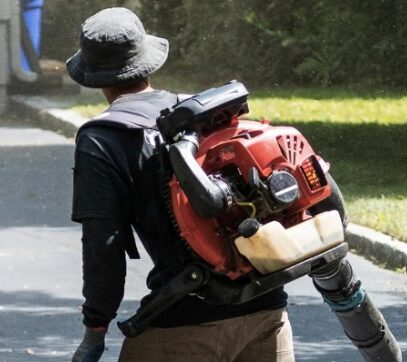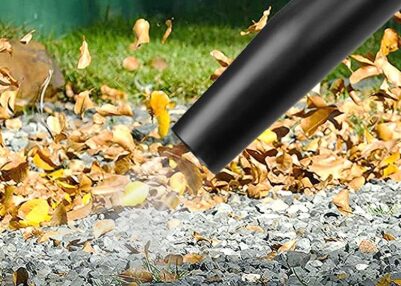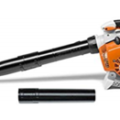Petrol (gas) leaf blowers are under fire for toxic emissions, noise pollution, and health risks. This article looks into the evidence, should they be banned, and is battery power the better future?
Should Petrol Leaf Blowers Be Banned? A Closer Look
When Blowers Become Blights. Imagine a world where your peaceful Saturday morning is rudely interrupted by the roar of a leaf blower, a portable tornado of pollution, pushing leaves and toxins around like a hyperactive kid in a sweetshop. For too long, gas-powered leaf blowers have been the garden tool equivalent of that neighbour who DJs at 7am. But it’s not just noise: they’re spraying out much more than yard waste. With growing concern about emissions, public health, and the environment, many are asking: should we simply ban them?

Pros and Cons of Petrol (Gas) Leaf Blowers
The Case Against - Pollution, Noise, and Health Hazards
1, Toxic Emissions
Gas leaf blowers often use two-stroke (gas + oil) engines, which are notoriously inefficient. According to grassroots campaigners, up to a third of that fuel-oil mix gets emitted as aerosol without being burned properly, releasing particulate matter (PM), nitrogen oxides (NOx), volatile organic compounds (VOCs), and even benzene and formaldehyde.
These emissions are not trivial: a 2023 report cited by The Washington Post says lawn equipment (including blowers) produced over 68,000 tons of NOx and 350,000 tons of VOCs in the U.S. alone.
Some activists claim that running a gas leaf blower for an hour produces as much pollution as driving a family car for many hours. (While the "15‑hour car driving" anecdote varies, the underlying point that blowers are disproportionately polluting is backed by serious data.)
2, Noise Pollution
Petrol blowers are loud. Very loud. Measurements show many exceed 100 decibels (dBA) at the operator’s ear which is comparable to a chainsaw or motorcycle.
That’s not just annoying: prolonged exposure to such noise can lead to hearing damage, elevated stress hormones, high blood pressure, and other health effects. Moreover, because of the low-frequency nature of their sound, the noise travels surprisingly far and can penetrate windows and walls.

3, Ecosystem Disruption
Leaf blowers don’t just move leaves, they whip up dust, pollen, and even pesticides. They can also disturb topsoil, erode it, and disrupt habitats for insects and small wildlife that use fallen leaves for shelter.
4, Public Health Concerns
The combination of air pollutants and noise isn’t just annoying, it’s potentially dangerous. Communities (especially in the U.S.) have pushed back, with some cities banning or restricting gas blowers.
In certain places, these machines are now being called out for degrading people’s quality of life and contributing to chronic stress, not to mention respiratory risks.
The Case For: Power, Performance, and Practicality
1, High Power Output
Gas-powered leaf blowers remain a favourite for many professionals because they deliver serious raw power. For large-scale jobs, commercial landscaping, or very dense leaf piles, petrol blowers often outperform cheaper battery options in sustained power.
2, Longevity and Refuel Speed
Unlike battery models, petrol blowers can be refuelled quickly, you don’t have to wait for a recharge. For contractors or gardening services doing back-to-back jobs, this rapid turnaround is a real advantage.
3, Cost for Commercial Users
Some landscapers argue that gas blowers are more cost-effective in the long run, especially for pro crews. The initial investment in petrol machines plus fuel, when amortised over heavy use, can still make financial sense versus constantly replacing batteries or investing in high-capacity ones.
4, Resistance to Change
There is a cultural inertia here. Many workers, landlords, and homeowners are used to gas-powered tools. Switching to electric or battery models requires buying new equipment, training, and in some cases, infrastructure for charging. For some, that’s a big hurdle.

Conclusion - It’s Time to Change Over to Battery-Powered
So, should petrol leaf blowers be banned? Based on the evidence, there’s a very strong case yes. They emit nasty pollutants, they’re loud enough to disrupt and harm, and they make life harder for our lungs, our ears, and our wildlife. The arguments in favour - power, refuelling speed, and cost for professionals are real, but they are increasingly being challenged by rapid advances in battery technology.
Battery Powered
Battery-powered leaf blowers today are quieter, produce zero tailpipe emissions, and are getting more powerful and affordable every year. While they may still lag in continuous runtime compared to a petrol machine, the trade-off in health, environmental impact, and community peace seems more than worth it.
Regulators in many U.S. cities are already waking up to this, banning or phasing out gas blowers, while encouraging electric alternatives. And organisations such as Gasbusters argue for a full phase-out, citing both public health and environmental benefits.
In short: yes, petrol leaf blowers should be banned or heavily restricted in favour of cleaner, quieter options. The future of lawn care is electric or better yet, manual. It’s time to stop blowing smoke (literally) and start clearing leaves in a way that doesn’t cost the planet or your peace of mind.





Recent Comments